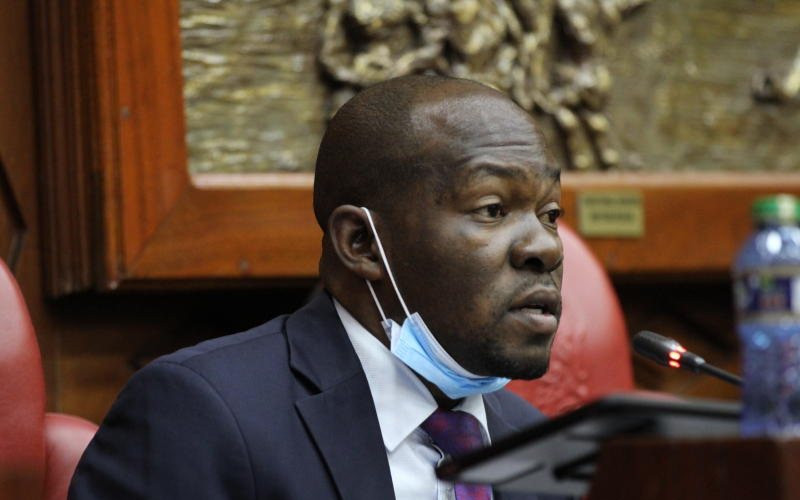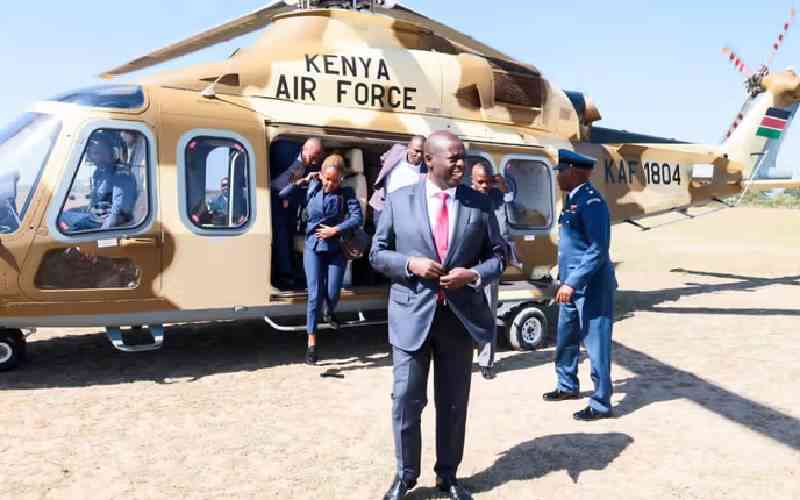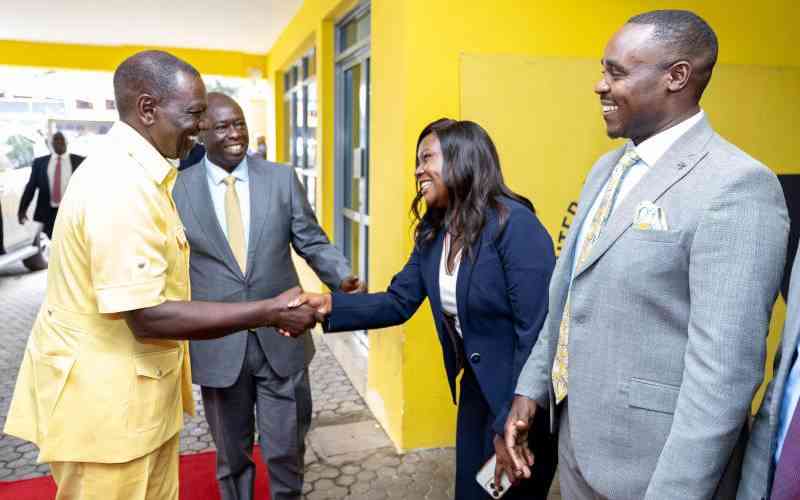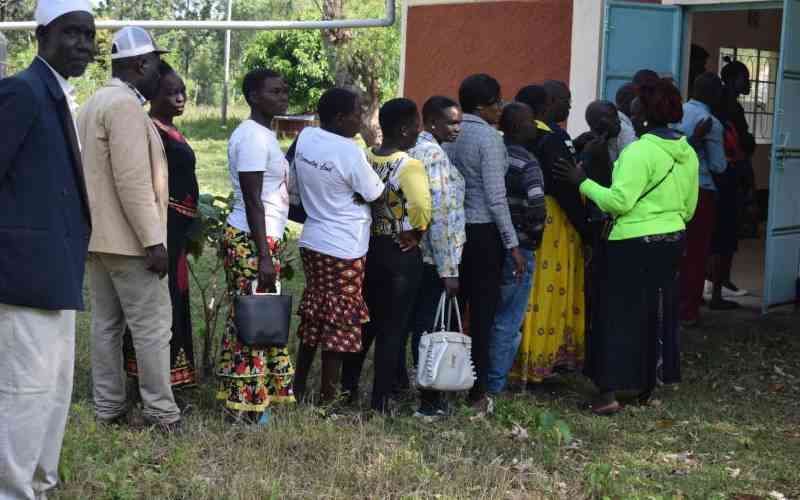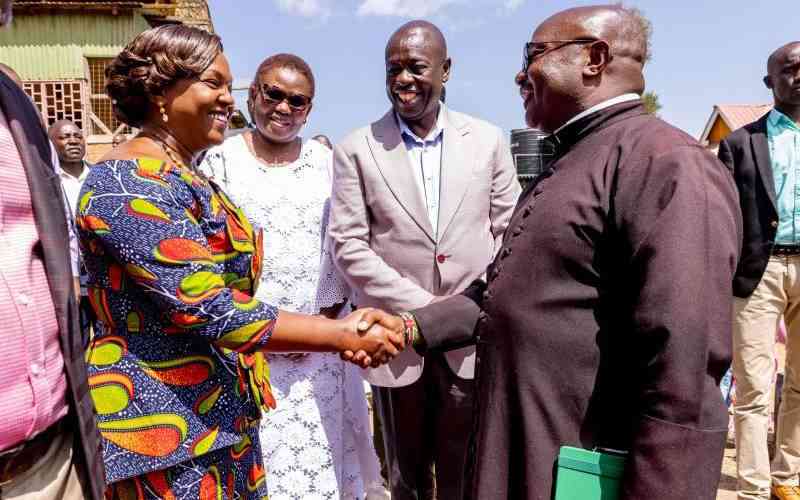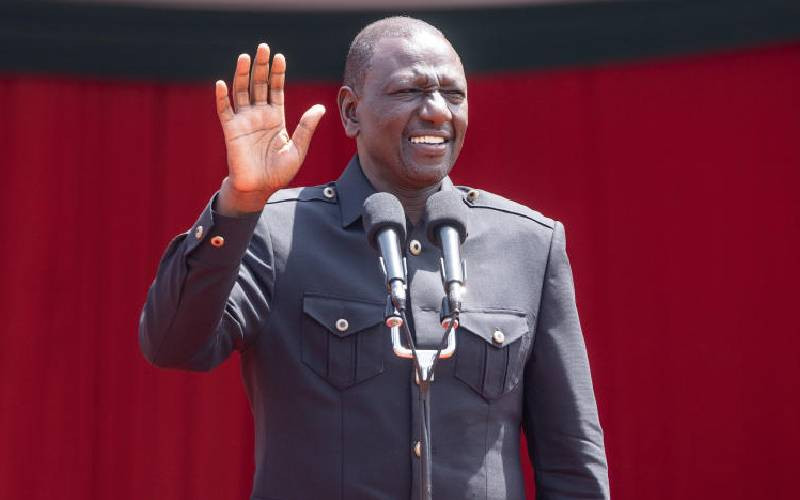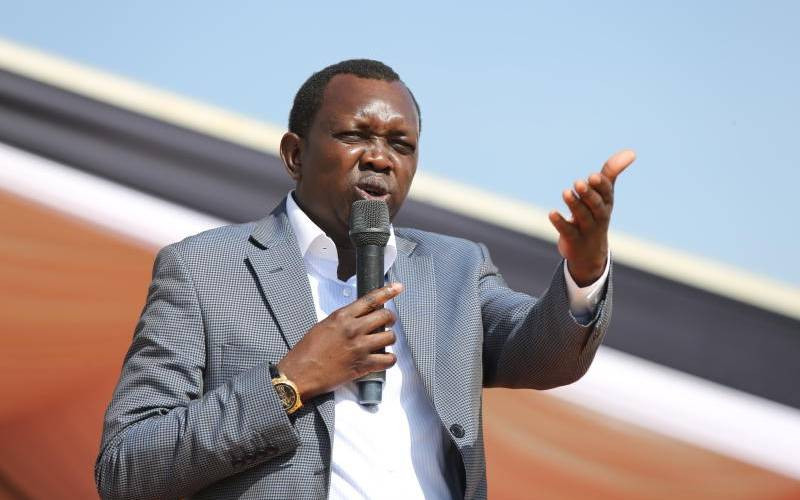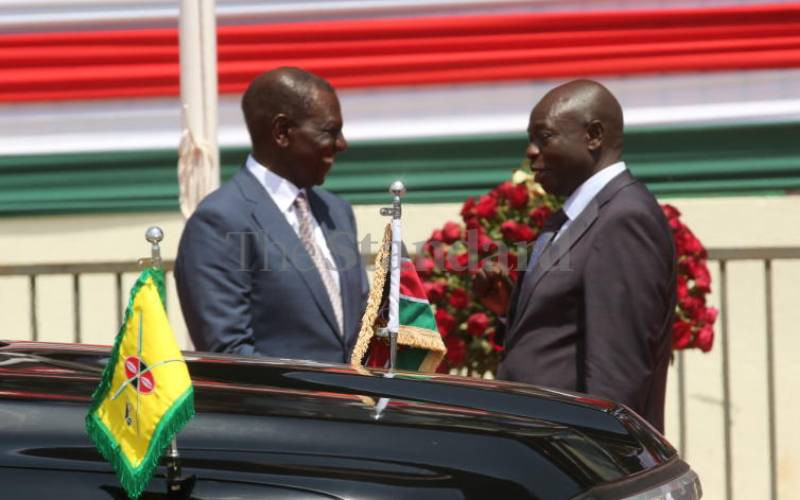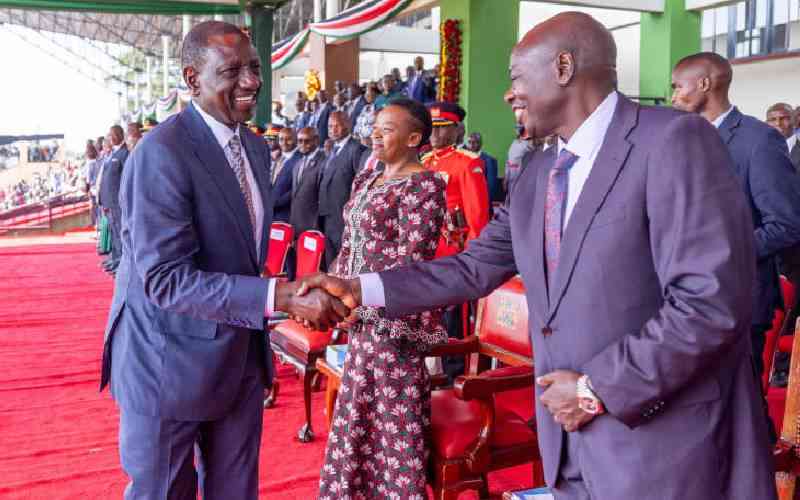
The rivalry between President William Ruto and his predecessor Uhuru Kenyatta is showing no signs of ageing - more than 10 months since the presidential election was concluded. In any democratic country, Ruto's victory, which was upheld by the country's Supreme Court, should have laid any reservations over the vote to rest.
But in Kenya, where presidential election results have been contested since 2007, last year's vote has just deepened the animosity between Ruto and Uhuru, whose favorite candidate, Raila Odinga, was defeated. The former Head of State now seems unhappy, even bitter, because Raila's loss left him with an egg on his face. The loss was, by extension, a loss for him as he invested so much in Raila's campaign. Ruto's victory was, too, a rejection of Uhuru's legacy.
Although Uhuru peacefully handed over power to his successor, he still appears to be struggling to come to grips with the reality that the man he fought so much and humiliated in public is the president of the republic. Therefore, Uhuru's resurface on the political scene last month - a tectonic shift as it was nationally for a former Head of State - was both predictable and inevitable, if charged with risk.
Uhuru's attendance at the Jubilee party gathering on May 22 appeared a well-calculated strategy for the youthful former president. It was an attempt to remain relevant. And his reference to the defunct Building Bridges Initiative, or BBI, and wish to dust it up betokened that desire.
Active politics
There was no indication that Uhuru's decision to return to active politics was a desperate brinkmanship, even though he's prone to outbursts when irritated or disappointed, as happened in 2017 when he called the Supreme Court justices crooks and threatened to "revisit" and deal with them after they annulled his victory.
This time around, Uhuru must have felt that the ongoing political war in the country was not only on his party's future or its leadership structure but was also on Kenya's future, a zero-sum game that he couldn't afford to sit out. Uhuru has a lot to worry about - and much more to lose in his renewed feud with Ruto. After handing power to the man he maligned, it is logical for Uhuru to feel insecure - even agitated - over his political future, his legacy, and over his family's standing in a new Kenya under Ruto.
- Government committed to increase AIDs funding
- Ruto: Universal health plan is unstoppable
- Residents urge Ruto to save struggling Mediheal Hospital-Eldoret
- Ruto's health agenda in limbo amid court cases
Keep Reading
Already, the new president and his team have signaled their desire to get back at the former president, talking ill of his legacy and accusing him of financing the rowdy rioters that recently paralysed the capital and Kisumu, as well as other towns in the western region of the country. Uhuru's comeback was beneficial to both the government and the opposition. A politically active Uhuru will help bolster the opposition's efforts to delegitimize Ruto's presidency. Raila and his team - Kalonzo Musyoka, of Wiper, Martha Karua, of Narc Kenya, and Eugene Wamalwa, of Democratic Action Party of Kenya - have for months been trying unsuccessfully to rally Kenyans behind their crusade to invalidate Ruto's victory.
Uhuru's return was also a windfall for Ruto and his team - especially the Mount Kenya troika, Deputy President Rigathi Gachagua, National Assembly Majority leader Kimani Ichung'wah and Cabinet Secretary for Investments, Trade and Industry Moses Kuria - who have been pining for an opening to consign the Kenyattas to history.
For the Mount Kenya trio, Uhuru's politicking was just what the doctor ordered. The former president - their thinking goes -would now be fair game for vitriol insults, like any other politicians. Even before Uhuru's attendance at the Jubilee convention, there were signs that one day the difference between Uhuru and Ruto could burst into the open.

Incessant denigrations against the former head of state, which have reached a crescendo in recent months, didn't help matters. The relationship between Ruto and Uhuru was largely brittle, even in the best of times. Theirs was always ephemeral and opportunistic. In 2007, they were on opposite sides of the political divide. Their respective parties' dispute over the election results almost plunged the country into a civil war.
In 2013, when they joined ranks and ran under the umbrella of one party, the glue that held them together was the International Criminal Court charges against them. As soon as they won the presidency and the ICC's concern was removed, their old rivalry re-emerged. Their second term in power was characterised by open hostility and tongue-lashing that continued well into the last days before the August 9, 2022 elections.
Backing Raila
When Ruto, then-deputy president, decided to run for president, Uhuru backed Ruto's opponent, Raila, even though the former head of state had, in his public statements, hinted at supporting Ruto's presidential ambition. Since Ruto's victory, the two have barely been on talking terms, as their friendship was replaced by mutual suspicion and open resentment toward one another.
The pair's political feud is now shaping up to be a marathon rather than a sprint, and Uhuru hardly seems ready for a complete exit from national politics, which, if he does, could jeopardize the interests of the Kenyatta family and erase its carefully choreographed history. Ruto knows his longevity depends on the ouster of the Kenyattas and Odingas - the dynasties on whose message for power ran.
The dynasties, too, feel Ruto is a threat to their future. In their view, Ruto is an emerging strongman and, given space, could finish them off politically, so the time to confront him is now. This mutual mistrust is compelling each side to watch closely the actions and utterances of the other. If, for instance, Uhuru's speeches and the alleged behind-the-scene machinations turn into concrete actions against the Kenya Kwanza rule, it's most likely that Ruto would lash out at his predecessor and intensify his anti-dynasty push, which, because of the fraught political atmosphere in the country right now, appears to have been delayed until Ruto's next term.
Uhuru's resurface was both an extension of Raila's anti-Ruto war and a reopening of the animosity between Ruto and Uhuru before and during the last August vote. In his May speech, Uhuru tried not to stir up a hornet's nest, yet he didn't shrink from sending a veiled warning to Ruto.
Two-way street
"We're very much alive," Uhuru said, urging those against his chairmanship of the Jubilee party to show respect, saying respect "is a two-way street. Behave like leaders and you shall be respected. Behave like thugs and you will be treated like thugs," Uhuru said in snarky remarks, whose desired target was the president and his allies, even though he was addressing a meeting attended by members of the Jubilee party that was convened to elect new party officials.
Uhuru's increasing assertiveness is certain to raise alarm bells within the Ruto administration, which can construe it as no less than a declaration of war from the son of Jomo, the country's first president. Given his financial muscle, national stature, and international friends, Uhuru's seeming open opposition to the incumbent could pose a greater irritant than the ongoing agitation by Raila, the Azimio leaders.

The form Ruto's pushback will take is unpredictable, but it could include setting slip the dogs of war, depriving Uhuru of privileges, and pressuring international partners to shun him if they wanted to be in Ruto's good books. The escalating enmity between the ruling elite and its predecessor is plunging the country into unchartered territory. It's the first time in the country's history that a former head of state has openly sided with an opposition group that says it doesn't recognize the country's president.
Having a politically active Uhuru on the national stage threatens to open a new front for President Ruto, who's already grappling with the economic mess left behind by the Uhuru administration.
Distraction
A full-on Ruto-Uhuru war has also the potential to distract the sitting government's attention and put a damper on its plans to turn around the country's economy. But it is unlikely to lead to the removal of Ruto, a wily master strategist who outwitted both Uhuru, his former boss, and Raila, Uhuru's protege.
Any aggressive opposition by Uhuru is going to be damaging to the reputation of the former head of state and the business interests of his family. The Kenyan public could conclude that the Kenyattas are selfish trouble-makers who won't allow others to rule the country. Throwing a fit or resorting to the streets after an election loss is par for the course in the country, but having a former president, who should have retired six months after handing over power, balk at publicly endorsing his successor is an entirely different beast. The new phenomenon is making everyone - including the winners and the losers anxious about the future.
The argument that this predicament could have been averted had Uhuru congratulated Ruto and tamed his favorite candidate, Raila, is somewhat simplistic. The truth is, Kenya's new political reality is more nuanced. The grudge match between the former friends who turned foes can't easily be reduced to mere personal differences. The battle between them is over the soul of the country, and each one has little incentive to cede ground to the other and a strong appetite to get one up on the other.
The prevailing state of affairs speaks to a country, where a silent change rejecting the past is taking shape. Dragging the name of Uhuru, the only living former ruler, and his family in the mud is just the tip of the iceberg. Ruto's bottom-up insurgency last year, whose jingle was 'Freedom is Coming', was no less than a revolt seeking a new order in Kenya, an order that claims to be aiming for the betterment of the country.
Risky businesss
Uhuru and Raila, who failed to stop Ruto in his tracks last year, are now are at risk of being swept off the face of the country's political scene. As scions of Jomo and Jaramogi, they would have preferred the old order, which idolized dynasties, to a new one. Their interests would have better been served by the old dispensation.

Uhuru is likely to stand up and, for some time, keep fighting in the hope of saving the Kenyattas' history from being deleted from the country's collective memory. His now-intermittent speeches and appearances could soon become a regular anti-Ruto bashing.
A stratagem like that, however, runs the risk of flinging Uhuru into a face-to-face war with Ruto. The former head of state is already on the horns of a dilemma: A half-hearted fight will do little to influence national politics in any meaningful way, while a full-fledged anti-Ruto onslaught could easily be interpreted as an attempt at overthrowing a legitimate government and draw a hostile reaction from Ruto. Uhuru may have personal and family-related motives to remain in active politics, but the price for his new involvement could be too high - even ruinous - for him, for his family and for the country.
Ruto could not be more pleased. Uhuru's entry into the political fray will offer him a worthy fall guy and a better narrative. It will also give him an opportunity to exact his revenge on Uhuru and deliver a one-two punch to the man who tried to frustrate his dream to lead the country. After all, Uhuru has put himself in the line of fire. Ruto could also find a leeway to delay fulfilling Raila's election-related demands and focus on the tip of the spear, the man Kenya Kwanza supporters blame for unleashing Raila.
Kenyans, who traditionally have little love for dynasties, have so far exhibited no universal sympathy for Uhuru, whose regime mired the country in debt and whose security forces were accused of committing major human rights abuses to an extent bodies of extrajudicially killed people floated in rivers. This sense of sadism, which is the result of decades of insensitive governments, is manifesting itself in the way Kenyans are reacting to Uhuru's disdain for the sitting government and Kenya Kwanza's rejection of Uhuru's legacy. The goings-on are all pointers to a nation in transition, still looking for credible political stability after almost 60 years of independence.
It's hard to predict the Kenya that will emerge after the dust of this sparring between Ruto and Raila and between Ruto and Uhuru settles. Will it be a stronger and prosperous Kenya or a weak and politically unstable country that is stuck in a war between dynasties and hustlers? President Ruto adroitly routed Raila in last year's elections, but his ability to deal with several offensives from several fronts at the same time will be tested in the coming weeks and months.
A farsighted politician, he must have at least prepared for all possibilities.
 The Standard Group Plc is a multi-media organization with investments in media platforms spanning newspaper print
operations, television, radio broadcasting, digital and online services. The Standard Group is recognized as a
leading multi-media house in Kenya with a key influence in matters of national and international interest.
The Standard Group Plc is a multi-media organization with investments in media platforms spanning newspaper print
operations, television, radio broadcasting, digital and online services. The Standard Group is recognized as a
leading multi-media house in Kenya with a key influence in matters of national and international interest.

